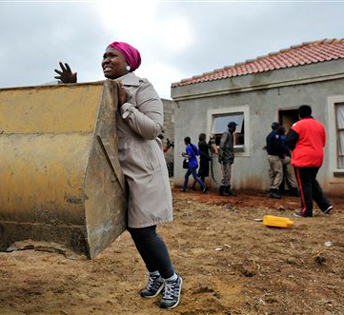
(FinalCall.com) – With the “stroke” of a pen, passage of the June 19, 1913 Native Land Act legalized atrocities committed against South Africa’s indigenous population.
Forced off of land Blacks had lived on since time immemorial, the new law gave substance to what Blacks already realized, the majority of South African land was now reserved for Whites.
Not only that, but according to the BBC, the land reserved for Blacks became “homelands” in which various tribal groups were “forcibly settled; segregated,” and used as “cheap labor pools,” in many cases similar to the share cropping experience of Black Americans at the beginning of the 19th century. Thus the formalized beginnings of the apartheid system of exploitation began.
One hundred years later, speaking in Johannesburg at a commemoration of the centenary of the 1913 Land Act, President Jacob Zuma testified that “a great wrong was done,” that needs to be followed-up with “a great right.”

“The pain of being driven off one’s land is worse than anything one can imagine,” he continued.
And though he said a great wrong was committed, that still continues to this very day, President Zuma admitted restitution has been slow and the 2014 land redistribution target would not be met.
According to published reports, land activists want the ANC-led government to be true to its word. In 1994 it “set a target of 25 million hectares (61,776,098 acres), representing 30 percent of agricultural land, for transfer to Africans within the first five years of the land redistribution program.”
But this has not happened. In fact, the Food and Allied Workers’ Union claims that 19-years-later only about 7 percent–between 5-6 million hectares (12,355,219 acres) of land–has been transferred to land claimants and land reform beneficiaries.
And on top of the above only 2.5 million hectares (6,177,609 acres) of private land so far has been transferred …” (Note: The 30 percent figure was always intended as an interim target, with the idea that the ultimate target should be in line with the country’s demographics.)
“Senior ANC leaders are very good at stating what the problem is and providing some relatively rigorous analysis … but what this leadership is far worse at doing (which includes Pres. Zuma) is acting on the implications of their analysis,” said James Schneider, editor-in-chief of the London-based online magazine ThinkAfricaPress.com, responding to a question from this writer about the South African government’s inability to hold true to the 1994 agreement.
During an e-mail exchange, from his London office, Schneider, whose publication has reported on South Africa’s land reform program, said to finally right this historic wrong “radical action was/is required.”
“The post 1994 government has not had the political will to do so. The basic framework for the government, at least up until the last 5-7 years, has been ‘the market.’ Using market mechanisms will not redress the fundamental inequalities in South Africa’s land distribution because current economic outcomes mirror and were in part built on those vast inequalities,” he said.
Dr. Edward Lahiff, an expert on South African land, agrees that less emphasis should be placed on the market and more on satisfying the food needs of individual households.
“The state agencies must get over their obsession with large-scale, commercial production and accept the need for a radical restructuring of current land units. The strategy of settling large groups of relatively poor and inexperienced people on large commercial farms and expecting them to manage those farms effectively has clearly failed. Land reform beneficiaries should be given the option to identify their own preferred means (and scale) of production and, within reason given the support necessary. Less emphasis on production for the market and more on meeting household food needs would help greatly. Training and credit opportunities should be provided in a gradual way so that small farmers can expand production at a pace that suits their individual circumstances,” said Dr. Lahiff recently on PBS’s Point of View.
Schneider believes that any program focusing on land reform should “be about food security and social, economic and environmental efficiency.” The fact that the “current distribution of land leaves millions of South Africans reliant on potentially volatile food prices and low nutrient food without employment or even the possible prospect of employment within (the current) economy” shows how ill equipped the program is in its current form.
And then there is the issue of expropriation. According to Dr. Lahiff, the former senior lecturer in land and agrarian studies at the University of Western Cape, “A degree of expropriation will be required in most areas.”
Actually the South African constitution allows for expropriating property “even in cases where the owners of that property are unwilling to part with the property … if the expropriation is aimed at redistributing land to address the effects of widespread colonial and apartheid-era land dispossession,” writes legal expert Pierre de Vos, who teaches law at the University of Cape Town.
Giving insight into the land expropriation question, Schneider brought Zimbabwe into the picture. He also made mention of former South African president Thabo Mbeki’s recent speech that focused on the reason why President Robert Mugabe is viewed with disdain by the United States and Europe.
“Thabo Mbeki is right in that inherited inequalities in access to resources, especially land, is a continuing injustice. Zimbabwe needed to address these inequalities, just as South Africa does. Mbeki is right that much of the criticism for the method of Zimbabwe’s Fast Track Land Reform are cloaked attacks on the very principle of land reform itself, and as such is an ‘offensive against the whole continent.’ While any land reform process that has to confront such stark inequalities will produce disruptions, it should be possible for South Africa to carry out land reform more smoothly than Zimbabwe was able to.”
Jehron Muhammad, who writes for The Final Call Newspaper from Philadelphia, can be reached at [email protected].












